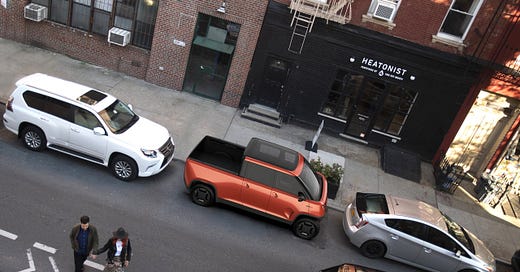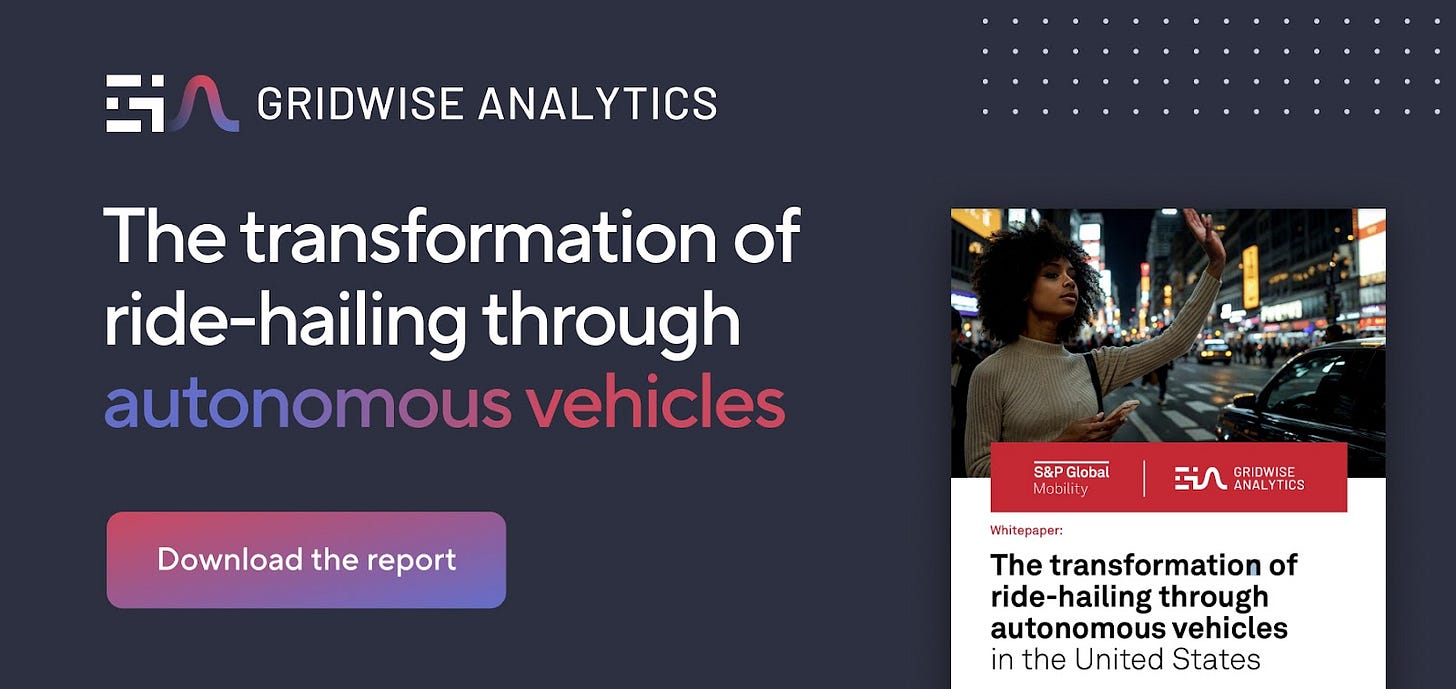Is Telo's MT1 The Perfect Urban Delivery Truck?
Bolt Plus gets upgrades, egrocery sales spike, Chinese couriers see gains
We’ve got a little bit of everything today: a must-see new vehicle, important changes to a 3PD’s subscription program, surging grocery sales and even some interesting policy developments in China and America…
Speaking of everything, you can’t miss this year’s Curbivore, returning to DTLA on April 10 & 11. You only have 3 days left to score Early Bird tickets for just $275.
This week’s edition is brought to you Gridwise.
Today:
Telo Trucks Unveils The Pint-Sized MT1
Bolt Rejiggers Premium Subscriptions
Chart Time | Grocery Deliveries Boom
Courier Pay Gains in China & America
VEHICLES | Telo Unveils Mini Pickup for Urban Users
EV upstart Telo Trucks officially unveiled its MT1 mini-pickup at an event in Southern California last week. In an era of ever bigger mega-vehicles, Telo is building a pickup with the footprint of a MINI Cooper: 152 inches long by 73 inches wide. Despite that, it still packs in a full-size 60 inch cargo bed, as well as a 350 mile range and seating for five. The truck is meant to easily navigate urban streets and parking spaces, while maintaining offroading capabilities for some fun in the wilderness as well.
The Big Picture: Telo is positioning its MT1 as the perfect work vehicle: throw your tools in the back, slap a rack on the roof, take it to tough job sites, etc. We’d argue this might be an ideal option for certain deliveries that won’t fit on an ebike or sidewalk bot. Think of those “big and bulky” orders from Walmart, Home Depot or even a huuuuge grocery haul. Vehicle pricing starts at $41,520, or $34,020 if buyers qualify for federal incentives (while they last,) which is a smidge more than non-electric options like a Toyota Tacoma ($31,590 MSRP) or Ford Maverick ($23,920.) But with low operating costs, maybe a courier-oriented fleet lessor can add these to its lineup?
PARTNER | Autonomous Vehicles Are About to Transform Rideshare – Here’s What You Need to Know
Autonomous vehicle firms like Waymo, Zoox, and Cybercab are set to reshape ride-hailing and on-demand delivery. But how will these firms tackle key challenges like market selection, optimizing fleet deployment, and balancing pricing strategies to maximize demand and profitability?
Together with S&P Global Mobility, Gridwise Analytics has compiled a must-read report detailing the key insights every mobility leader needs to know.
Key Findings:
Autonomous ride-hailing trips are growing fast, but AV pricing must hit $1 per mile to scale.
Fleet efficiency is a major challenge—AV fleets need to average 12-15% dead miles, but even the best ride-hail fleets operate at 20-22%.
Demand and pricing vary dramatically between and within cities, making fleet optimization complex.
Pooled rides are making a comeback, now at 1.7% of total rides (Sept 2024)—but still far from the 12-19% pre-pandemic levels.
Get the full report now to understand where AVs are headed.
MEMBERSHIP | Bolt Retools Bolt Plus Subscriptions
European 3PD + TNC Bolt is refreshing its premium subscription offering: Bolt Plus. The company’s VP of Delivery notes the program adds free deliveries (with order minimums) and cash-back of up to 15% on select rides, on top of existing perks like free cancellations, price change protections and priority pickup / delivery. Bolt Plus has been piloted in Lithuania, Romania and Portugal and has just gone live in the company’s home turf of Estonia. Exact pricing varies by market, with Romanian customers paying 29.99 RON ($6.57 USD) per month.
The Big Picture: Bolt has been on a real expansion spree as of late, pushing its delivery arm into hundreds of new cities, expanding its mobility biz to US/CAN, and even prepping for an IPO. Premium memberships have proven to be a real moneymaker for other operators, inducing customer loyalty while upping AOV. Uber, for example, grew its Uber One membership count 60% last year, hitting 30 million users. Other European deliverers, like Deliveroo, let subscribers get even more granular, thanks to various tiers like Plus Silver, Plus Gold and its exclusive, vaunted, luxurious Plus Diamond.
CHART TIME | Grocery Delivery Surges
Another month, another huge report from Brick Meets Click, showing egrocery sales continue to surge, hitting $10.3 billion in February, up from $10B in Jan. Delivery grew particularly well, up more than 45% versus a year ago. A surge in MAUs was the predominant factor, thanks to an expansion of users in the 60+ cohort and a rebound in penetration with 18 to 29-year-olds, plus strong gains in order frequency and AOVs.
LABOR | Chinese Delivery Platforms Compete Over Worker Benefits
Food delivery platforms in China, known locally as “waimai,” are piling on the perks, as both capitalistic competition and pressure from the government encourages operators to offer new benefits to couriers and drivers. The country’s dominant players, Meituan and Alibaba’s Ele.me, are expanding social insurance benefits for full-time workers; new entrant JD.com is luring workers with social security benefits, housing funds and insurance that covers work injuries, medical costs, unemployment, maternity leave and pension payments. China now has 82 million gig workers, including 10 million that do delivery, while Meituan has grown to do RMB 29 billion ($4B USD) in profit on RMB 249 billion in rev over the first 9 months of 2024.
The Big Picture: Pay and benefits have crept up in the United States as well, with select cities upping minimum pay requirements, and other states introducing portable benefit programs. New research shows that the rise of delivery has made restaurant labor far more productive, as workers are able to serve more customers and orders over the same amount of time. Big chains like Wendy’s, Burger King and Taco Bell saw the biggest boosts to productivity, thanks to reduced customer dwell time, suggesting that maybe the push to raise pay for fast food workers isn’t so crazy after all…
A Few Good Links
Indonesian mobility + delivery super app GoTo scores first profit, remains open to merger with Singapore’s Grab at a combined $23B value. Zomato completes rebrand to Eternal as it eyes new business lines. SaySo raises $4M to help retailers with clearance sales. McD’s creates restaurant experience team. Domino’s names new COO. Pizza Hut unveils charcuterie board for Pi Day. Seed oils found to be more healthy than butter. Faster labor contracts garner rare bipartisan support. Home Depot adds flatbed distro centers. Privatization would hurt USPS. EU adds retaliatory tariffs. TVS buys e-scooter startup Ion Mobility. Amazon restructures grocery and convenience biz. Sodexo intros One & All dining. HungerRush adds Uber Direct. Delta UFC 500 Ultra-Fast charger certified in Germany. French online supermarket La Fourche nears €100 million in revenue. Meet Amazon’s growing electric fleet.
Got a tip, feedback, or just want to say hi? Reply back to this email.
— Brought to you by the Curbivore Crew.








